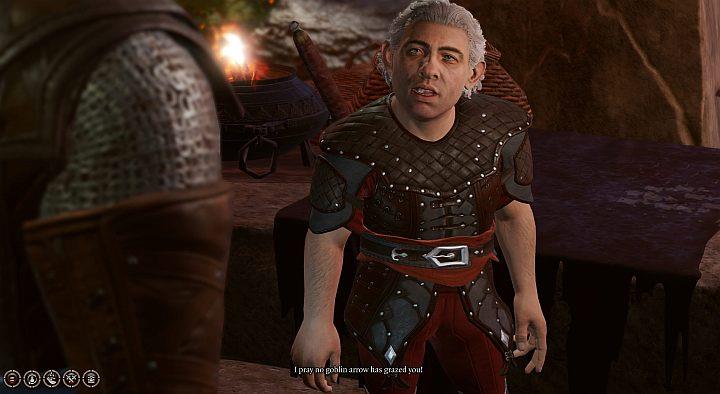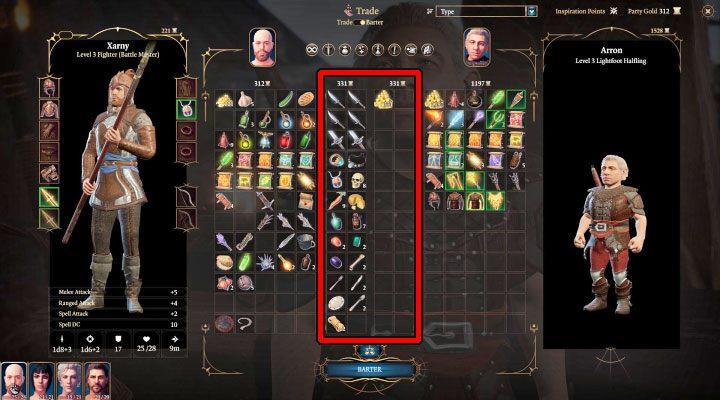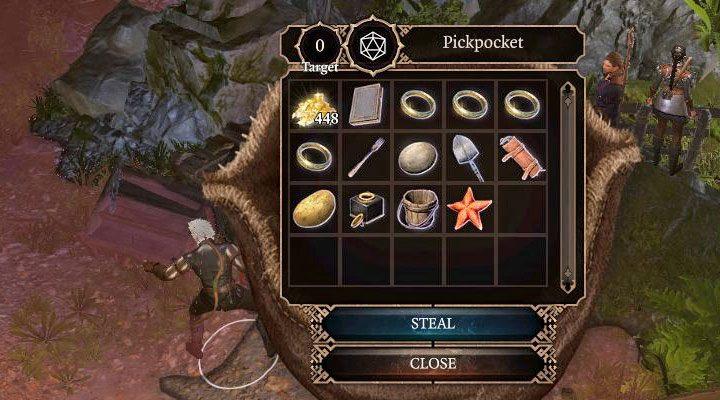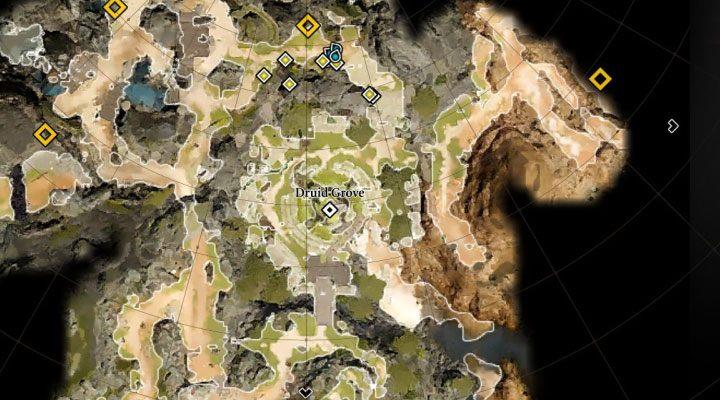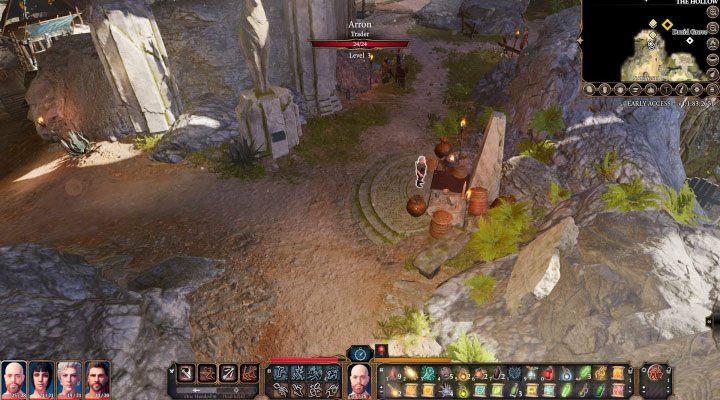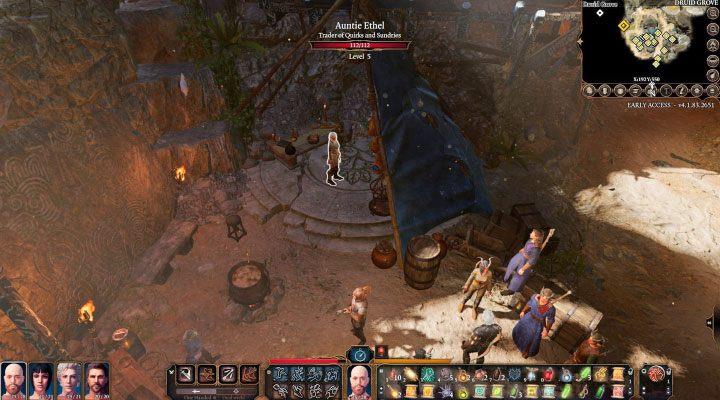In the vast and treacherous world of Baldur’s Gate 3, navigating the intricate web of merchants can be as crucial as battling fierce foes. Our comprehensive guide unveils the essential locations and strategies for trading, bartering, and even pilfering from these enigmatic vendors. From the bustling Druid Grove to the shadowy corners of the Underdark, discover where to find the best deals, what unique items are available, and the risks involved in robbing a merchant blind. Whether you’re a seasoned adventurer or a newcomer to Faerûn, this guide will equip you with all you need to master the art of commerce in your quest for glory.
Most important information about merchants
Merchants in Baldur’s Gate 3 play a crucial role in the game’s economy, offering players a variety of goods and services essential for their journey. Found primarily in villages and camps, the first major hub for trading is Druid Grove during Act 1, where players can encounter several unique merchants. Each merchant has a distinct inventory, selling items ranging from potions and weapons to rare alchemical ingredients. Players can engage in trade by selecting the appropriate options in dialogue, but they should be cautious, as insulting or harming merchants can lead to losing trading privileges. Additionally, players have the option to rob merchants, although this comes with significant risks, including potential hostility from the merchant and loss of access to their goods. Understanding these dynamics is vital for maximizing resources and navigating the challenges of the game effectively.
- You can meet merchants in various places in the game world. They mainly stay in various villages and camps. The first area with many traders is Druid Grove in act 1 and further down the page there is a list of merchants from this location.
- Talk to a trader and select the option to open trading window. By default, everyone has at least a neutral attitude towards the party. Insulting the inhabitants of a given location or causing their death will result in losing the option to trade with selected NPCs. Merchants are not immortal.
What is the difference between trade and exchange?
Trade and exchange are terms often used interchangeably, but they have distinct meanings in economic contexts. Trade typically refers to the broader concept of buying and selling goods or services, often involving a transaction where one party provides something of value in return for another item or service. This can include activities like stock trading or international trade between countries. In contrast, exchange is more specific and usually involves a direct swap of goods or services, such as returning an item to a store for a different one or converting one currency into another. Essentially, while all exchanges can be considered trades, not all trades qualify as exchanges due to the latter’s emphasis on reciprocal transactions.
- In Baldur’s Gate 3, there is a distinction between Trade and Barter. You can choose the type of transaction after the trade window has opened. There is a switch at the top of the screen (example in the picture).
- Trade requires paying gold for all transactions. You can buy items sold by the trader for gold, or sell your own goods.
- It’s worth knowing that the value of the items you can buy and sell does not necessarily correspond to the real values from their descriptions. Usually, you will pay more when buying a certain item and receive less when selling it.
- Exchange, as the name suggests, is about exchanging items. 2 vertical fields will appear on the screen. You can get rid of unwanted items and choose the ones you want from the merchant’s inventory (including gold).
- Both offers must ultimately be even. There is a button that allows you to pay extra in gold to this side, whose offer is less valuable.
How to rob a merchant?
Robbing a merchant in Baldur’s Gate 3 can be a tempting but perilous endeavor. To successfully steal from a merchant, players should first ensure they have a character proficient in Sleight of Hand and activate stealth mode to avoid detection. Theft can occur in various ways: players can pickpocket items directly from the merchant or steal from shop chests. However, each attempt to pilfer an item involves a skill check, requiring a roll that meets or exceeds the displayed difficulty. It’s crucial to save the game before attempting any theft, as getting caught may lead to hostile reactions from the merchant, permanently severing trade opportunities or even resulting in an attack against the player.
- Robbing merchants is possible inBG3, but it’s very risky. Being caught red-handed can mean that you won’t be able to trade with that merchant or get attacked by them. Save the game before you try to steal something.
- Select a character with the Sleight of Hand proficiency and activate the stealth mode. You can steal items in plain sight, from shop chests or directly from the merchant’s pocket by using pickpocketing. In the last case, every attempt to take an item is a separate skill check – you have to roll a value equal to or higher than the one displayed.
We discussed the topic of robbing the NPCs in more detail on a separate page – How to steal?.
List of traders in Druid Grove
Druid Grove serves as the first significant hub for traders in Baldur’s Gate 3, located in Act 1. Players can access this area by traveling northeast from the beach, where they will initially encounter a battle with goblins. Once the enemies are defeated and players gain entry to the Grove, they can interact with several merchants. Notable traders include Arron, who offers potions, magic scrolls, and various weapons; Dammon, who specializes in arrows and armor; and Auntie Ethel, who sells potions and rare alchemical ingredients linked to the main quest. This vibrant marketplace provides essential supplies and unique items crucial for players’ adventures.
- Druid Grove in act 1 is the first location in the game where you will come across various traders. You can get there by heading northeast from the beach. Upon entering the Grove, a battle with a group of goblins will commence. Together with the Grove’s inhabitants you must defeat all the enemies.
- After the battles, you can approach the large gate of the Druid Grove. You will be let in and you can reach the merchants listed below.
- Arron sells potions, magic scrolls, various types of arrows, sets for opening locks and disarming traps, torches, melee weapons, and clothes. He also has a large amount of gold, so you can sell him unwanted items.
- Dammon sells different types of arrows, melee and ranged weapons, shields, and various pieces of armor. This trader also has a lot of gold.
- Auntie Ethel sells various potions and rare alchemical ingredients. This character is also associated with the Removing the Parasite main quest. In the next part of the game, she will move to the Riverside Teahouse (a hut in the marshes).
- When you encounter Mattie, he will ask you to play a game using a ring that supposedly brings good luck – this is optional. He sells sets for opening locks and unique rings. This merchant has the least gold of all the traders in the Grove.
What are the best strategies for negotiating with merchants in Baldur’s Gate 3
Negotiating effectively with merchants in Baldur’s Gate 3 can significantly enhance your gameplay experience, allowing you to maximize profits and acquire essential items at lower costs. Here are the best strategies to employ:
Leverage Charisma
- Choose the Right Character: Always conduct transactions with a character who has high Charisma, such as Bards, Paladins, or Sorcerers. Their natural charm can lead to better prices, allowing you to buy items cheaper and sell them for more.
- Utilize Persuasion Skills: Characters with proficiency in Persuasion can further reduce prices. Each point in Persuasion decreases the buying price by approximately 4%, making it crucial to have your most persuasive character handle all merchant interactions.
Improve Merchant Attitude
- Increase Merchant Favor: Merchants have an attitude rating that affects their pricing. You can improve this by giving them gold or trading in a way that benefits them. For example, selling items at a loss (from their perspective) or gifting low-value items can enhance their attitude towards you, resulting in better deals over time.
- Maximize Attitude Gains: To reach the maximum attitude of 100 with a merchant, you may need to invest significant gold based on your level. This investment pays off by drastically reducing prices for future transactions.
Strategic Trading
- Donate Unwanted Items: Offloading useless items for free can improve a merchant’s attitude without expecting anything in return. This tactic is particularly useful when dealing with merchants who offer valuable items.
- Adjust Game Difficulty: A less conventional but effective method is to temporarily lower the game difficulty before trading. This can simplify interactions and make it easier to secure better deals.
By combining these strategies—leveraging high Charisma characters, improving merchant attitudes, and engaging in strategic trading—you’ll be well-equipped to navigate the bustling marketplaces of Faerûn and emerge victorious in your quests.
Which characters are best for negotiating with merchants in Baldur’s Gate 3
The best characters for negotiating with merchants in Baldur’s Gate 3 are those with high Charisma and Persuasion skills, as these traits directly influence trading outcomes. Here are the top choices:
Ideal Characters for Merchant Negotiations
-
Bard
- Bards excel in Charisma and often have proficiency in Persuasion, making them exceptional negotiators. Their abilities allow them to secure significant discounts and maximize profits when selling items.
-
Paladin
- With a naturally high Charisma, Paladins can effectively negotiate better prices. Their strong moral code may also resonate positively with certain merchants, enhancing their trading experience.
-
Sorcerer
- Sorcerers benefit from high Charisma and can leverage their charm in negotiations, making them suitable for haggling with merchants.
-
Warlock
- Although not as commonly recognized, Warlocks can also be effective negotiators due to their decent Charisma scores and potential proficiency in Persuasion.
Additional Tips for Successful Negotiations
- Maximize Merchant Attitude: Building a good relationship with merchants by gifting items or gold can lead to better prices over time. Each merchant has a unique attitude score that affects trade outcomes.
- Utilize Persuasion Skills: Characters with high Persuasion can negotiate lower prices and receive higher offers when selling items. This skill is crucial for maximizing trading efficiency.
By focusing on these characters and strategies, players can enhance their trading capabilities and navigate the merchant landscape of Baldur’s Gate 3 more effectively.
